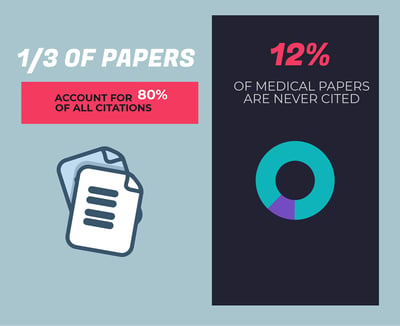If you’re a research scientist, you know that reading peer-reviewed journal articles is central to a successful research project. But all too often, literature search and discovery can feel like a never-ending challenge.
In the early stages of your research project, you need to read through a substantial number of related journal articles in order to understand what has already been published. Doing so will help you formulate a boundary-pushing research question that will fill a gap in your field of study.
Of course, literature search and discovery doesn’t stop once you’ve formulated your research question. Throughout the entire research cycle, it’s vital to stay abreast of newly published works that may influence the direction of your research. Plus, you need to know if another researcher beats you to the punch. Nobody likes to be scooped!
Conducting a comprehensive literature search is an exhausting and time-consuming endeavor. But there are a number of things you can do to make the process go more smoothly. For example, it’s important to determine which discovery portals will be most appropriate for your study. (Read this blog post to learn more).
And remember, keywords are key! Before you delve into your literature search, identify the keywords, terms, and phrases that will return the best results. To refine your search even further, it’s important that you know how to get the most out of your discovery portal’s search capabilities—using Boolean Operators, truncation, MeSH terms, and more. (Learn key facts about PubMed, Google Scholar, and Scopus).
Never Stop Searching
As mentioned earlier, staying up to date on newly published research is vital. But doing so can feel overwhelming (to say the least!) due to the enormous amount of new research being published regularly. And it's not just the constant hunting and gathering part that’s a challenge; you also have to consume and digest the knowledge. As far as I know, there aren't any tools to help you with the latter, but there are tools to help you stay current.
One of the easiest ways to keep up with newly published content is to subscribe to the tables-of-contents (TOC) of appropriate journals. Here's a tip: During your initial literature searches, keep track of which publications show up frequently, then sign up for alerts from those relevant journals. That way, every time a new issue of the journal is published, you’ll get an alert letting you know. Then you can quickly scan its TOC for related articles.
Harness Your Knowledge
Within the early stages of the research lifecycle, some scientists consider literature search as the “easy” part. Figuring out the best way to access, organize, and keep track of the articles and references they've acquired is often seen as the more daunting challenge.
But it doesn’t have to be so hard.
Today, new research tools are emerging that can help you make the most of the knowledge you’ve acquired. Reprints Desk's Article Galaxy platform, for example, offers a variety of research apps (called Gadgets), which can be used to streamline the way you search, collect, and manage scholarly content. Here’s an illustration of how these modern tools might be used in the early phases of your research study:
- Conduct your initial keyword search using the PubMed Searcher Gadget, which in addition to PubMed’s search features, provides information like Altmetric scores (showing a paper’s popularity) and pricing and availability options.
- When you find relevant papers you want to read, you can order them from within the PubMed Searcher Gadget. Alternately, you can order articles using the Document Delivery Gadget. Both Gadgets let you order articles on demand, while taking advantage of low-cost and Open Access filters to make sure you get the best price on the content you collect
No question, the research lifecycle is a complex process that includes a multitude of disparate tasks that can be difficult to master. But things are changing. Today, innovative tools are being developed that can help scientists and researchers work more efficiently—at every stage of the research lifecycle (read more here: Modern Science Apps Are Accelerating the Research Lifecycle).


